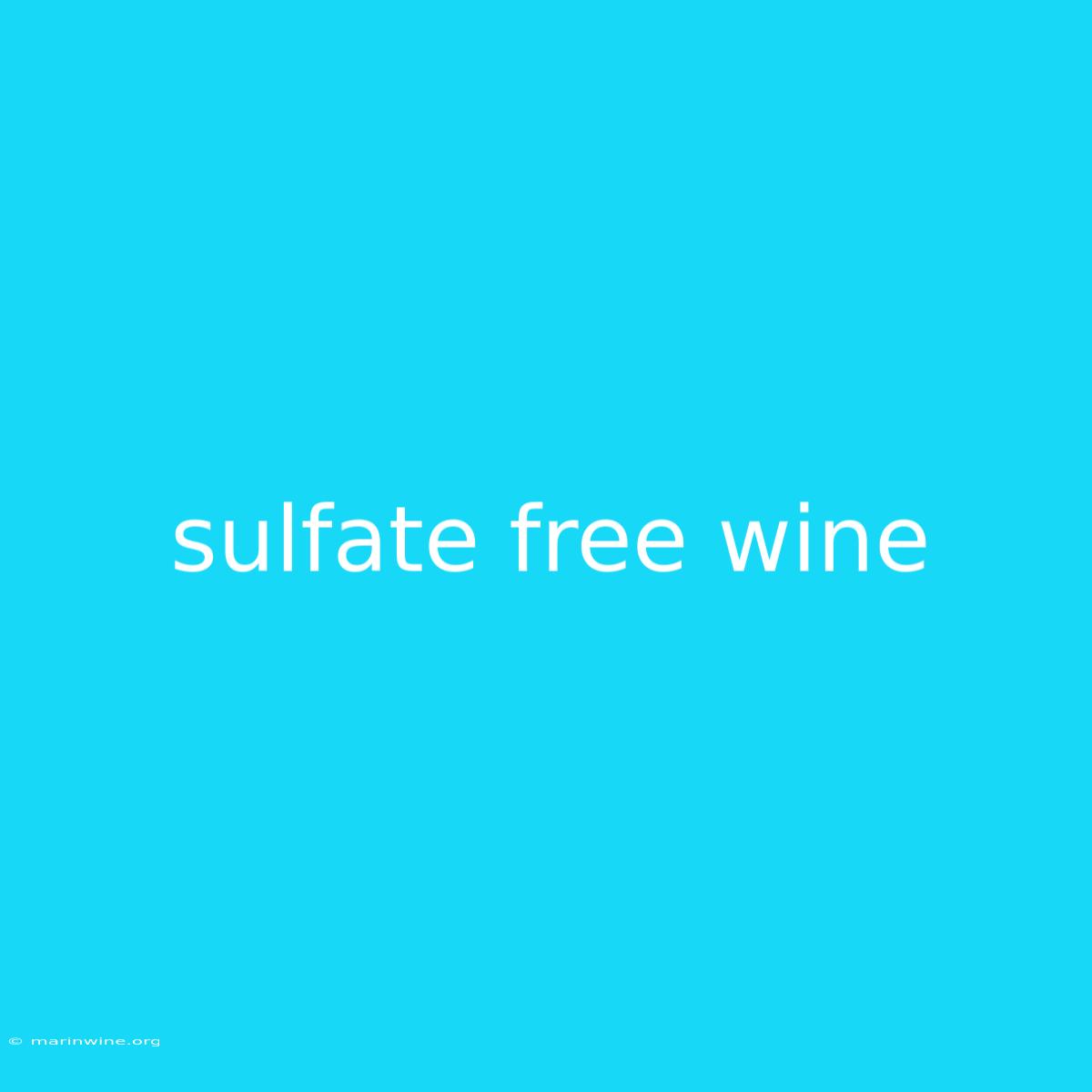Is Sulfate-Free Wine a Myth? Unveiling the Truth About Winemaking and Sulfites
Have you ever wondered about those "sulfite-free" wines you see on shelves? The idea of wine without sulfites seems appealing, but is it actually possible? Sulfites are naturally present in wine, and removing them completely is a complex and controversial process.
Why It Matters: This article explores the complexities of sulfate-free wine, debunking common myths and providing a clear understanding of sulfites in wine. It delves into the science behind sulfites, their role in winemaking, and the implications of eliminating them.
Key Takeaways of Sulfate-Free Wine
| Takeaway | Description |
|---|---|
| Sulfites in Wine | Sulfites are naturally occurring compounds found in grapes and added during the winemaking process for preservation and stability. |
| Sulfite-Free Claims | "Sulfite-free" labels are often misleading as they don't necessarily mean the wine is entirely free of sulfites. |
| Benefits of Sulfites | Sulfites protect wine from oxidation, bacteria, and spoilage, ensuring longevity and quality. |
| Alternatives to Sulfites | Winemakers are exploring alternative preservation methods, but sulfites remain the most effective and reliable. |
| Consumer Considerations | While some individuals may be sensitive to sulfites, for most, they pose little risk. |
Understanding Sulfites in Wine
Sulfites are naturally occurring compounds found in grapes, acting as a natural antioxidant. However, winemakers often add sulfites during fermentation and bottling to further prevent oxidation and microbial spoilage. This addition helps ensure the wine remains stable, retains its color, flavor, and aroma for extended periods.
The Myth of "Sulfite-Free" Wine
"Sulfite-free" wine is often a misleading term. While winemakers can minimize sulfite levels through careful handling and alternative preservation methods, completely eliminating them is nearly impossible. This is because sulfites are produced naturally during fermentation and cannot be fully removed.
The Role of Sulfites in Winemaking
- Preservation: Sulfites act as a powerful antioxidant, preventing oxidation and preserving the wine's color, aroma, and flavor.
- Stability: They inhibit the growth of harmful bacteria and yeasts, ensuring the wine's long-term stability.
- Quality Control: By controlling the levels of sulfites, winemakers ensure the wine meets quality standards.
Exploring Alternatives to Sulfites
While sulfites are effective, there are alternative preservation methods that winemakers are exploring:
- Micro-oxygenation: Gently introducing controlled amounts of oxygen to the wine can encourage oxidation in a controlled manner, enhancing flavor complexity without compromising stability.
- Inert Gases: Using nitrogen or argon gas can displace oxygen, preventing oxidation and microbial growth.
- Natural Antioxidants: Some winemakers are experimenting with natural antioxidants, like grape seed extract, to limit sulfite use.
However, these alternatives often require greater expertise and control, and their effectiveness is not as established as sulfites.
Sulfites and Consumer Sensitivity
While sulfites are generally safe for most individuals, some people experience adverse reactions like headaches, nausea, or allergic reactions. These reactions are often linked to the consumption of red wine and occur in a small percentage of the population.
FAQ for Sulfate-Free Wine
Q: Are sulfites dangerous? A: Sulfites are generally safe in moderate amounts. Only a small percentage of people experience sensitivity to sulfites.
Q: Why are sulfites added to wine? A: Sulfites are added to prevent oxidation, bacterial growth, and spoilage, ensuring the wine's quality and longevity.
Q: Is "sulfite-free" wine truly free of sulfites? A: No, "sulfite-free" wine may contain very low levels of sulfites, but they are not entirely absent.
Q: How can I find low-sulfite wines? A: Look for wines labeled "low-sulfite" or "minimal sulfites." You can also ask your local wine merchant for recommendations.
Q: What if I am sensitive to sulfites? A: If you experience adverse reactions, avoid wines labeled with "contains sulfites."
Q: Can I make wine at home without sulfites? A: Making homemade wine without sulfites is possible but challenging. It requires careful hygiene, controlled environment, and knowledge of alternative preservation methods.
Tips for Choosing Wine with Low Sulfite Levels
- Look for labels: Wines labeled "organic," "biodynamic," or "natural" are often made with minimal sulfites.
- Seek out smaller producers: Smaller wineries often have more control over their winemaking process and may use less sulfites.
- Experiment with varietals: Certain grape varietals, like Pinot Noir, are naturally lower in sulfites.
- Consider alternative beverages: If you are particularly sensitive, explore alternative beverages like cider, beer, or spirits.
Summary of Sulfate-Free Wine
While "sulfite-free" wine is a popular term, completely eliminating sulfites from wine remains a complex process. Sulfites play a crucial role in preserving wine quality and are generally safe for most individuals. Exploring alternative preservation methods is ongoing, offering hope for reducing sulfite levels in the future. Ultimately, informed consumers can make informed choices about their wine consumption based on their individual sensitivities and preferences.
Closing Message: The debate around sulfites in wine is ongoing, and understanding the science behind them is essential. Whether you choose to seek out low-sulfite options or embrace the benefits of sulfites in winemaking, making informed choices based on knowledge empowers you to enjoy wine responsibly.

